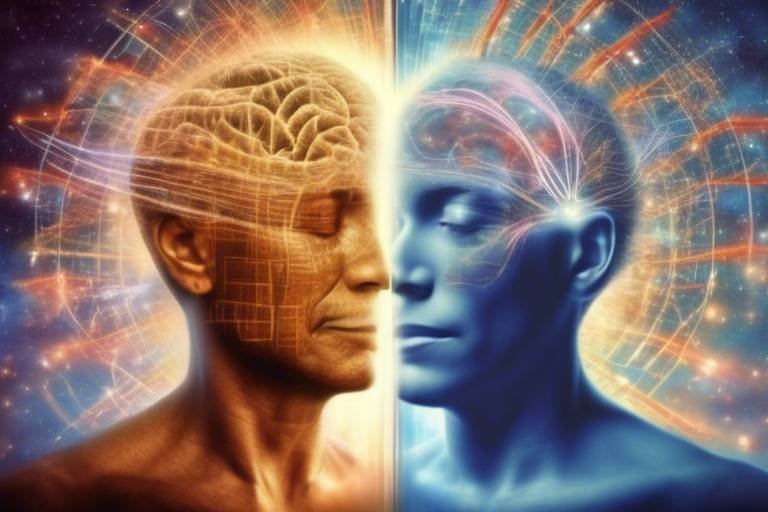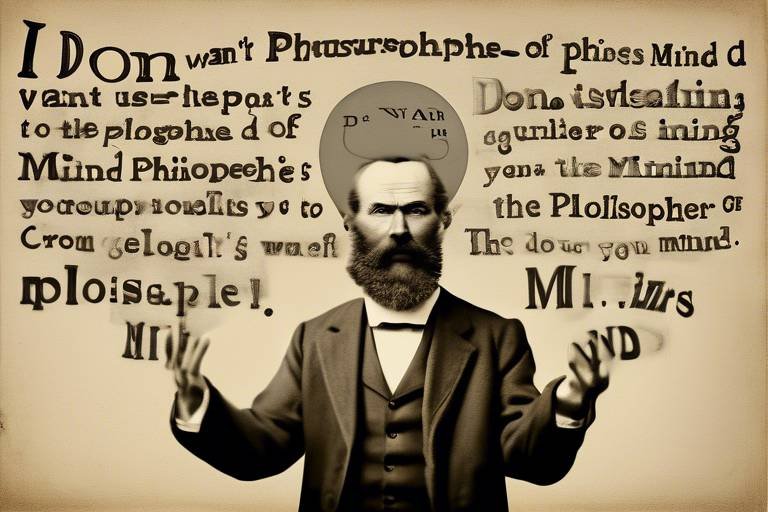Phenomenal Consciousness vs Access Consciousness
In the vast landscape of cognitive science and philosophy of mind, the concepts of phenomenal consciousness and access consciousness stand out as pivotal yet distinct categories. Understanding these two forms of consciousness is like peeling an onion; each layer reveals deeper insights into the nature of human experience. So, what exactly do we mean by these terms, and why should we care? Let's dive in and explore the nuances that separate them and the implications they hold for our understanding of the mind.
Phenomenal consciousness is all about the subjective experience of perceptions and sensations. It's what makes life rich and colorful—literally! Imagine tasting a ripe, juicy strawberry; the sweetness, the texture, the vibrant red color—all of these elements come together to form a unique experience. This is what phenomenal consciousness encapsulates: the qualitative aspects of our experiences. It’s not just about knowing that you’re tasting something; it’s about the actual feeling of that taste. This subjective quality is often referred to as qualia, which are the building blocks of our conscious experience.
On the flip side, we have access consciousness, which deals with the cognitive availability of information. Think of it as the mental toolbox that allows us to reason, make decisions, and guide our behavior based on what we know. Unlike phenomenal consciousness, which is deeply personal and subjective, access consciousness is more about the information that can be reported or utilized. It’s like having a library of knowledge at your disposal—ready to be accessed when you need to make a choice or solve a problem. This form of consciousness is essential for navigating the complexities of daily life, as it helps us to process information and act accordingly.
Qualia are fascinating because they are the individual instances of subjective experience that characterize phenomenal consciousness. They are what make our experiences uniquely ours. For example, the taste of chocolate is not just about the flavor; it’s about the memories it evokes, the emotions it stirs, and the sensations it brings. This rich tapestry of experiences shapes our perception and awareness in a way that is deeply personal. To illustrate this, consider the following examples of qualia:
- The sound of a piano—how it resonates in a quiet room.
- The color red—how it can evoke feelings of passion or anger.
- The warmth of sunlight on your skin—how it brings comfort and joy.
Each of these experiences highlights the richness of phenomenal consciousness and its inherent subjectivity. They raise important questions about how we experience the world around us and how those experiences influence our behavior and thoughts.
The existence of qualia opens up a Pandora's box of philosophical questions about the nature of reality and the mind-body problem. If our experiences are so subjective, how do they relate to the physical processes in our brains? This question challenges our understanding of consciousness and forces us to reconsider the relationship between our experiences and the world around us. Are our perceptions merely illusions, or do they hold some deeper truth about reality?
Access consciousness plays a vital role in cognitive science, influencing how we study attention, memory, and decision-making. Researchers delve into how information is processed and utilized in conscious thought, providing insights into various cognitive functions. This understanding is crucial for developing strategies to improve learning, enhance memory retention, and even tackle mental health issues. It’s like shining a spotlight on the inner workings of the mind, revealing how we think, feel, and act based on the information we have at our disposal.
When we compare phenomenal and access consciousness, the differences in their functions and implications become clear. Phenomenal consciousness is about the rich, subjective experiences that shape who we are, while access consciousness is about the information that we can report and use in our decision-making processes. Understanding these differences enhances our grasp of consciousness and its role in human experience. It’s like understanding the difference between a beautiful painting (phenomenal consciousness) and the artist’s notes on how to create it (access consciousness).
The relationship between these two types of consciousness is complex and fascinating. Phenomenal experiences can inform access consciousness; for instance, the emotional impact of a song can influence our decision to listen to it again. Conversely, access consciousness can influence how we interpret our phenomenal experiences. If we know that a particular food is unhealthy, our perception of its taste might change, affecting our enjoyment of it. This interplay creates a dynamic system where our experiences and knowledge continuously shape each other.
The distinctions between phenomenal and access consciousness raise important questions for the development of artificial intelligence. As we strive to create more sophisticated AI systems, understanding these concepts can guide us in simulating aspects of human consciousness. Can machines ever truly experience qualia, or will they always operate on a level of access consciousness? This inquiry not only pushes the boundaries of technology but also challenges our understanding of what it means to be conscious.
- What is the main difference between phenomenal and access consciousness? Phenomenal consciousness refers to subjective experiences, while access consciousness relates to the cognitive availability of information.
- Why are qualia important? Qualia are essential for understanding how personal experiences shape perception and awareness, highlighting the subjective nature of consciousness.
- How do these concepts apply to artificial intelligence? Understanding phenomenal and access consciousness can inform the development of AI systems that mimic human-like consciousness.

Defining Phenomenal Consciousness
Phenomenal consciousness is a term that dives deep into the ocean of subjective experience. Imagine standing in front of a vibrant sunset, where the colors blend into a breathtaking palette. That feeling you get, the warmth of the sun on your skin, the gentle breeze, and the sight of the hues melting into one another—this is what phenomenal consciousness is all about. It’s not just about observing; it’s about experiencing. It emphasizes the qualitative aspects of consciousness, focusing on what it feels like to have experiences.
To break it down, phenomenal consciousness encompasses the raw, subjective experiences known as qualia. These are the building blocks of our sensory experiences and emotions. For instance, when you taste a ripe strawberry, you don’t just recognize it as a fruit; you experience its sweetness, its juiciness, and the vibrant red color that catches your eye. This rich tapestry of sensations is what phenomenal consciousness captures—it’s the essence of what it feels like to be alive and aware.
In the realm of cognitive science and philosophy, understanding phenomenal consciousness is crucial. It raises questions about the nature of reality and our perception of it. How do these subjective experiences relate to the physical processes in our brains? Can we ever fully explain the richness of our experiences through scientific means? These questions are not just academic; they touch upon the core of what it means to be human.
To illustrate this further, consider the following aspects of phenomenal consciousness:
- Subjectivity: Each individual has a unique perspective shaped by their experiences, making consciousness inherently personal.
- Qualitative Nature: It focuses on the qualities of experiences—how they feel, rather than just how they are categorized.
- Emotional Depth: Phenomenal consciousness encompasses emotions, adding layers to our experiences that influence our thoughts and actions.
In summary, phenomenal consciousness is not merely a scientific concept; it is a fundamental aspect of our existence that shapes our understanding of the world. It invites us to explore the depths of our experiences, urging us to appreciate the richness of life through the lens of our unique perceptions. As we delve deeper into the study of consciousness, we uncover the intricate connections between our experiences and the broader philosophical questions they evoke.

Understanding Access Consciousness
Access consciousness is a fascinating concept that dives deep into how we utilize our conscious experiences for reasoning and decision-making. Unlike phenomenal consciousness, which is all about the rich tapestry of subjective experiences—like the vibrant colors we see or the emotions we feel—access consciousness is more about the cognitive processes that allow us to report those experiences and use them in our daily lives. Think of it as the control center of your mind, where information is not just experienced but also made available for thought and action.
To put it simply, access consciousness is what enables you to reflect on your experiences and make choices based on them. For instance, when you taste a delicious piece of chocolate, your phenomenal consciousness captures the delightful sensation and flavor. However, access consciousness allows you to think, "This chocolate is amazing! I want to eat more" or "I should share this with my friend." This duality showcases how our minds operate on different levels, each serving a unique purpose.
In cognitive science, access consciousness plays a critical role in understanding how we process information. Researchers investigate how attention, memory, and decision-making are influenced by what we can consciously access. For example, when you're trying to solve a problem, your access consciousness helps you retrieve relevant memories and knowledge, guiding you toward a solution. It's like having a mental toolbox where you can pull out the right tools when you need them.
Moreover, access consciousness is essential for communication. When you articulate your thoughts or feelings to someone, you are relying on your access consciousness to organize and express those experiences in a way that others can understand. This ability to convey information is fundamental to human interaction, making access consciousness a cornerstone of our social lives.
To illustrate the differences between phenomenal and access consciousness, consider the following table:
| Aspect | Phenomenal Consciousness | Access Consciousness |
|---|---|---|
| Definition | Subjective experience of perceptions and sensations | Cognitive availability of information for reasoning |
| Focus | Qualitative aspects of consciousness | Utilization in decision-making |
| Examples | Feeling joy, seeing colors | Recalling memories, making choices |
As we explore the intricacies of access consciousness, it becomes clear that it is not just about what we experience but how we can harness those experiences to navigate the world around us. It's a complex interplay of awareness and cognition that shapes our understanding and interactions. So, the next time you find yourself making a decision or sharing a thought, remember the incredible work your access consciousness is doing behind the scenes!
- What is the main difference between phenomenal and access consciousness?
The main difference lies in their functions: phenomenal consciousness focuses on the subjective experience, while access consciousness deals with the cognitive availability of that information for reasoning and decision-making.
- How does access consciousness affect decision-making?
Access consciousness allows individuals to retrieve relevant information and experiences, guiding them in making informed decisions based on their thoughts and feelings.
- Can access consciousness be measured?
While it is challenging to measure directly, researchers use various cognitive tasks and assessments to infer the workings of access consciousness and its impact on behavior.

The Qualia of Experience
When we talk about qualia, we're diving into the deep end of what it means to truly experience the world around us. Imagine biting into a ripe strawberry. That burst of sweetness, the vibrant red color, the way the juice trickles down your chin—these sensations aren't just data points; they are the essence of your experience. Qualia are the building blocks of our subjective reality, the unique flavors of our personal consciousness.
To put it simply, qualia are the individual instances of subjective experience that shape how we perceive and interpret the world. They are the 'what it feels like' aspect of consciousness, and they can vary dramatically from person to person. For instance, the color blue may evoke a sense of calm for one person, while another might find it cold and uninviting. This variability highlights the intricate tapestry of human experience.
Consider the following examples of qualia:
- The sensation of warmth from the sun on your skin.
- The taste of your favorite dish—perhaps a creamy mac and cheese.
- The sound of a loved one’s laughter echoing in your ears.
Each of these experiences is rich with qualitative details that contribute to our understanding of what it means to be conscious. They are not merely sensory inputs; they are deeply woven into the fabric of our perceptions, influencing our emotions and thoughts.
The philosophical implications of qualia are profound. They challenge us to consider questions like: What is the relationship between qualia and the physical processes in our brains? Are qualia something that can ever be fully explained through science, or do they represent a fundamental aspect of consciousness that eludes empirical scrutiny? This inquiry leads us to grapple with the mind-body problem, a central debate in philosophy that questions how our mental experiences relate to our physical existence.
In essence, qualia serve as a reminder that consciousness is not just a series of cognitive processes; it is also a deeply personal, subjective experience. Understanding qualia enriches our grasp of consciousness itself, inviting us to explore the mysteries of our own minds and the rich tapestry of human experience.

Examples of Qualia
When we delve into the world of qualia, we're essentially exploring the unique, personal experiences that define our perception of reality. Imagine biting into a piece of chocolate; the richness and smoothness you feel are not just physical properties but subjective sensations that exist solely in your mind. This is a perfect example of qualia in action. Each person's experience of chocolate can vary dramatically—while one might savor a deep, bitter note, another may perceive it as overwhelmingly sweet. This subjective nature of experience is what makes qualia so fascinating and essential to understanding consciousness.
Another vivid example of qualia can be found in music. Think about the sound of a piano, the way it resonates in the air, creating a tapestry of notes that can evoke a spectrum of emotions. For some, the sound may bring joy and nostalgia, while for others, it might stir feelings of sadness or longing. This emotional response highlights how the quality of our experiences shapes our memories and feelings, making each encounter with music a personal journey.
Color perception is also a prime example of qualia. Consider the color red. It’s not just a wavelength of light; it’s a profound experience that can invoke a sense of warmth, passion, or even danger. Each individual’s perception of red can be influenced by cultural context, personal experiences, and emotional state. This variability underscores the richness of phenomenal consciousness and how it colors our interpretation of the world around us.
To put it simply, qualia are the building blocks of our subjective experiences, and they come in various forms. Here’s a quick rundown of some common examples:
- Taste: The sweetness of honey versus the bitterness of black coffee.
- Sound: The soothing notes of a lullaby compared to the chaotic noise of a bustling city.
- Touch: The softness of a kitten's fur versus the roughness of sandpaper.
- Color: The vibrant blue of a clear sky versus the dull gray of a rainy day.
These examples illustrate how qualia are not merely abstract concepts; they are integral to our daily experiences and interactions with the world. Understanding qualia allows us to appreciate the complexity of our consciousness and the rich tapestry of human experience. Each person's qualia are unique, contributing to the diverse ways we interpret and engage with our surroundings.

Philosophical Implications of Qualia
This article explores the distinctions between phenomenal consciousness and access consciousness, highlighting their definitions, implications, and relevance in cognitive science and philosophy of mind.
Phenomenal consciousness refers to the subjective experience of perceptions and sensations. It encompasses what it feels like to have experiences, such as seeing colors or feeling emotions, emphasizing the qualitative aspects of consciousness.
Access consciousness pertains to the cognitive availability of information for reasoning and guiding behavior. It focuses on the aspects of consciousness that can be reported and utilized in decision-making processes.
Qualia are the individual instances of subjective experience that characterize phenomenal consciousness. They are crucial for understanding how personal experiences shape perception and awareness in a unique manner.
Common examples of qualia include the taste of chocolate, the sound of a piano, and the color red. Each of these experiences highlights the richness of phenomenal consciousness and its inherent subjectivity.
The existence of qualia raises profound philosophical questions about the nature of reality and the mind-body problem. These questions challenge our understanding of consciousness and the intricate relationship between experience and physical processes. For instance, consider the classic philosophical thought experiment known as "Mary's Room," where Mary, a scientist who knows everything about color but has never experienced it, sees red for the first time. This scenario illustrates that knowing all the physical facts about color does not equate to understanding the qualitative experience of seeing red. It suggests that qualia are not easily reduced to physical explanations, leading to debates about whether consciousness can be fully explained through neuroscience alone.
Moreover, the implications of qualia extend into areas such as:
- The Nature of Subjectivity: How can we account for the deeply personal nature of experiences?
- Ethics of Consciousness: If qualia are unique to individuals, what does this mean for moral considerations regarding sentient beings?
- The Limits of Scientific Inquiry: Are there aspects of consciousness that science may never fully grasp?
These philosophical inquiries not only deepen our understanding of consciousness but also challenge the boundaries of science and philosophy, inviting ongoing exploration into the essence of human experience.
Access consciousness plays a vital role in cognitive science, influencing how we study attention, memory, and decision-making. It helps researchers understand how information is processed and utilized in conscious thought.
The comparison between phenomenal and access consciousness reveals significant differences in their functions and implications. Understanding these differences enhances our grasp of consciousness and its role in human experience.
The relationship between phenomenal and access consciousness is complex, as phenomenal experiences can inform access consciousness, while access consciousness can influence how we interpret our phenomenal experiences.
The distinctions between phenomenal and access consciousness raise important questions for the development of artificial intelligence. Understanding these concepts can guide the creation of more sophisticated AI systems that simulate aspects of human consciousness.
Phenomenal consciousness refers to the subjective experience of perceptions and sensations, while access consciousness pertains to the cognitive availability of information for reasoning and decision-making.
Qualia are important because they highlight the subjective nature of experiences, raising philosophical questions about the relationship between mind and body and the limits of scientific understanding.
This is a debated topic. While AI can simulate responses that mimic human behavior, whether it can truly experience qualia as humans do remains an open question.

Access Consciousness in Cognitive Science
This article explores the distinctions between phenomenal consciousness and access consciousness, highlighting their definitions, implications, and relevance in cognitive science and philosophy of mind.
Phenomenal consciousness refers to the subjective experience of perceptions and sensations. It encompasses what it feels like to have experiences, such as seeing colors or feeling emotions, emphasizing the qualitative aspects of consciousness.
Access consciousness pertains to the cognitive availability of information for reasoning and guiding behavior. It focuses on the aspects of consciousness that can be reported and utilized in decision-making processes.
Qualia are the individual instances of subjective experience that characterize phenomenal consciousness. They are crucial for understanding how personal experiences shape perception and awareness in a unique manner.
Common examples of qualia include the taste of chocolate, the sound of a piano, and the color red. Each of these experiences highlights the richness of phenomenal consciousness and its inherent subjectivity.
The existence of qualia raises philosophical questions about the nature of reality and the mind-body problem, challenging our understanding of consciousness and the relationship between experience and physical processes.
Access consciousness plays a vital role in cognitive science, influencing how we study attention, memory, and decision-making. It helps researchers understand how information is processed and utilized in conscious thought. Essentially, access consciousness is like the stage manager of our cognitive theater, ensuring that the right information is available for the actors—our thoughts and actions—to perform effectively.
In the realm of cognitive science, access consciousness is often explored through various experimental paradigms. For instance, researchers might use tasks that require participants to respond to stimuli while measuring their reaction times and accuracy. This allows scientists to infer how information in our conscious mind is organized and accessed. One key area of focus is the distinction between implicit and explicit memory, where access consciousness is critical in determining whether a memory can be consciously recalled or just unconsciously influenced.
Furthermore, access consciousness is essential for understanding phenomena such as attention. When we focus on a specific task, we are actively engaging our access consciousness. This selective attention allows us to filter out distractions and prioritize information that is relevant to our goals. In this way, access consciousness acts as a gatekeeper, controlling what enters our conscious awareness and what remains in the background.
To illustrate the importance of access consciousness in cognitive science, consider the following table that compares aspects of access consciousness with phenomenal consciousness:
| Aspect | Access Consciousness | Phenomenal Consciousness |
|---|---|---|
| Definition | Cognitive availability of information | Subjective experience of sensations |
| Function | Guides behavior and decision-making | Shapes perception and awareness |
| Examples | Solving a math problem | Feeling joy from a sunset |
In summary, access consciousness is not just a passive state; it actively shapes our interactions with the world around us. By understanding how access consciousness functions within cognitive science, we can gain insights into the complex processes that govern our thoughts, decisions, and ultimately, our behaviors.
The comparison between phenomenal and access consciousness reveals significant differences in their functions and implications. Understanding these differences enhances our grasp of consciousness and its role in human experience.
The relationship between phenomenal and access consciousness is complex, as phenomenal experiences can inform access consciousness, while access consciousness can influence how we interpret our phenomenal experiences.
The distinctions between phenomenal and access consciousness raise important questions for the development of artificial intelligence. Understanding these concepts can guide the creation of more sophisticated AI systems that simulate aspects of human consciousness.
- What is the main difference between phenomenal consciousness and access consciousness? Phenomenal consciousness relates to the subjective quality of experiences, while access consciousness pertains to the availability of information for reasoning and decision-making.
- How does access consciousness affect our daily lives? Access consciousness helps us focus on relevant information and influences our decisions and actions based on what we are consciously aware of.
- Can machines have access consciousness? Currently, machines can process information and make decisions, but whether they possess true access consciousness, akin to human experience, remains a topic of debate.

Comparing the Two Types of Consciousness
When diving into the fascinating world of consciousness, it's essential to understand the distinct characteristics that separate phenomenal consciousness from access consciousness. At first glance, they may seem similar; after all, both pertain to our conscious experiences. However, the nuances between them are what make this topic so intriguing. Phenomenal consciousness is all about the subjective experience—the way we perceive and feel sensations. Think of it as the vibrant colors of a painting, where each brushstroke contributes to the overall experience. On the other hand, access consciousness is akin to the artist's toolbox, representing the cognitive resources available for reasoning and decision-making.
To further explore these differences, consider the following key aspects:
| Aspect | Phenomenal Consciousness | Access Consciousness |
|---|---|---|
| Nature | Subjective experience | Cognitive availability |
| Focus | Qualitative aspects of experience | Information processing and decision-making |
| Examples | Feeling joy, seeing colors | Recalling a memory, solving a problem |
This table illustrates how phenomenal consciousness emphasizes the qualitative nature of our experiences, while access consciousness is more about the functional role these experiences play in our cognitive processes. For instance, when you savor a piece of chocolate, the rich taste and texture you experience fall under phenomenal consciousness. However, when you decide to buy that chocolate based on your taste preferences and past experiences, you're engaging access consciousness.
Moreover, the interplay between these two types of consciousness is a dynamic dance. Phenomenal experiences can inform our access consciousness, shaping our decisions and thoughts. For example, if a particular song evokes strong memories, that emotional response can influence your choice to listen to it again. Conversely, access consciousness can help us interpret and make sense of our phenomenal experiences. If we know that a specific color is associated with calmness, we might consciously choose to surround ourselves with that color to evoke a particular emotional state.
Understanding these distinctions is not just an academic exercise; it has real-world implications. For instance, in fields like psychology and cognitive science, grasping the differences between these types of consciousness can enhance our approaches to therapy and mental health. By recognizing how subjective experiences shape cognitive processes, therapists can develop more effective strategies for their clients.
In summary, while phenomenal consciousness and access consciousness are interrelated, they serve different functions in our understanding of the mind. By appreciating their unique characteristics, we can gain a deeper insight into the complexities of human experience and the mechanisms that drive our thoughts and actions.
- What is the main difference between phenomenal and access consciousness?
Phenomenal consciousness relates to the subjective experience of sensations, while access consciousness refers to the cognitive availability of information for decision-making. - Can you give an example of phenomenal consciousness?
An example would be the feeling of happiness when seeing a loved one or the taste of your favorite food. - How does access consciousness influence our behavior?
Access consciousness allows us to use past experiences and information to guide our decisions and actions.

Interplay Between Phenomenal and Access Consciousness
The relationship between phenomenal consciousness and access consciousness is a fascinating dance that reveals much about how we experience the world and make decisions. Think of phenomenal consciousness as the vibrant canvas of your mind, where every color, sound, and emotion paints a unique picture of your experiences. Meanwhile, access consciousness acts like the curator of this gallery, selecting which pieces of information are available for reasoning, decision-making, and action. It's a bit like having a library full of books (phenomenal consciousness) but only being able to read and reference a few at any given time (access consciousness).
To illustrate this interplay, consider a moment when you taste a delicious piece of chocolate. Your phenomenal consciousness is flooded with the rich, creamy texture and the sweet, indulgent flavor, creating a sensory experience that is deeply personal and subjective. However, your access consciousness allows you to reflect on that experience, guiding you to remember how much you enjoyed it and perhaps influencing your decision to buy chocolate again in the future. In this way, the subjective experience informs your cognitive processes, demonstrating how intertwined these two aspects of consciousness truly are.
Moreover, this interplay can lead to a deeper understanding of how we navigate complex situations. For instance, when faced with a challenging decision, the emotions and sensations tied to past experiences (phenomenal consciousness) can provide valuable insights that inform our reasoning (access consciousness). This dynamic can be seen in various scenarios, such as:
- Emotional Decision-Making: When you feel anxious about a job interview, your phenomenal consciousness might draw on past experiences of similar situations, influencing your access consciousness to prepare more thoroughly.
- Creative Problem Solving: Artists often tap into their phenomenal experiences to inspire their work, while their access consciousness helps them articulate and refine their ideas.
- Social Interactions: When you meet someone new, your phenomenal consciousness captures their smile and warmth, while your access consciousness helps you decide how to engage in conversation.
This intricate relationship not only enhances our understanding of human experience but also poses intriguing questions about the nature of consciousness itself. Can we truly separate the two, or are they fundamentally intertwined? As we delve deeper into cognitive science and philosophy, exploring this interplay may reveal new insights into the very fabric of our conscious lives.

Implications for Artificial Intelligence
The distinctions between phenomenal consciousness and access consciousness are not just academic musings; they have profound implications for the development of artificial intelligence (AI). As we strive to create machines that can replicate human-like understanding and behavior, grappling with these two types of consciousness becomes essential. AI systems, while increasingly sophisticated, often lack the rich, subjective experiences that characterize phenomenal consciousness. This absence raises questions about whether machines can ever truly "understand" or "feel" in the same way humans do.
To illustrate, consider how humans process information. Our phenomenal consciousness allows us to experience the world in vivid detail—like savoring the taste of a delicious meal or feeling the warmth of sunlight on our skin. These experiences are deeply personal and subjective. In contrast, access consciousness enables us to report on these experiences and use them in decision-making. For example, we might use our memory of enjoying a particular dish to decide where to eat next. AI, on the other hand, can analyze data and make decisions based on algorithms, but it lacks the qualitative experience that informs human choices.
As AI continues to evolve, understanding the nuances of consciousness can guide developers in creating systems that not only process information but also simulate aspects of human experience. Here are some key implications for AI development:
- Enhanced User Interaction: By integrating elements that mimic phenomenal consciousness, AI can create more engaging and relatable interactions with users. Imagine a virtual assistant that can understand not just your commands but also your emotional state!
- Better Decision-Making Algorithms: Utilizing principles from access consciousness could lead to more effective decision-making frameworks in AI, allowing machines to evaluate options based on a broader context.
- Ethical Considerations: As we develop AI that may simulate consciousness, ethical questions arise. Should we attribute rights to machines that exhibit signs of access consciousness, even if they lack phenomenal experiences?
Moreover, the challenge of replicating phenomenal consciousness in machines leads us to ponder whether true understanding is possible without subjective experience. Can an AI that processes information without feeling ever truly grasp the essence of human emotions? This question is not merely philosophical; it has practical implications for fields such as healthcare, where empathetic interactions can significantly impact patient outcomes.
In conclusion, the implications of understanding phenomenal and access consciousness extend far beyond theoretical discussions. They shape the trajectory of AI development, influencing how we create machines that can interact with humans on a deeper level. As we delve into these complexities, we must remain vigilant about the ethical ramifications and the potential consequences of creating systems that may one day mimic our own consciousness.
- What is phenomenal consciousness? Phenomenal consciousness refers to the subjective experience of perceptions and sensations, highlighting the qualitative aspects of awareness.
- How does access consciousness differ from phenomenal consciousness? Access consciousness relates to the cognitive availability of information for reasoning and behavior guidance, focusing on what can be reported and utilized.
- Can AI ever achieve phenomenal consciousness? Currently, AI lacks the subjective experiences that characterize phenomenal consciousness, raising questions about its ability to truly understand or feel.
- What ethical considerations arise from AI simulating consciousness? As AI systems become more sophisticated, ethical questions about rights and responsibilities may emerge, particularly if machines exhibit signs of access consciousness.
Frequently Asked Questions
- What is the difference between phenomenal consciousness and access consciousness?
Phenomenal consciousness refers to the subjective experience of perceptions and sensations—basically, it’s all about what it feels like to experience something. On the other hand, access consciousness is more about the cognitive availability of that information for reasoning and guiding behavior. It’s like having a library of experiences; phenomenal consciousness is the books themselves, while access consciousness is your ability to pull out a book and use that information.
- Can you give examples of qualia?
Absolutely! Qualia are the individual instances of subjective experiences. For instance, think about the taste of chocolate—it's not just a flavor; it’s a rich, sweet sensation that evokes memories and feelings. Similarly, the sound of a piano can transport you to a different place, and the color red can ignite emotions. Each of these experiences is unique and highlights the richness of phenomenal consciousness.
- Why are qualia important in philosophy?
Qualia raise fascinating questions about the nature of reality and the mind-body problem. They challenge our understanding of consciousness by asking how subjective experiences relate to physical processes. It’s like trying to figure out how a beautiful painting can evoke feelings while being just paint on canvas—this complexity is what makes qualia so intriguing in philosophical discussions.
- How does access consciousness impact cognitive science?
Access consciousness is crucial in cognitive science as it helps researchers explore how we process information, pay attention, and make decisions. It’s like having a control center in our brains that decides what information is relevant and how we utilize it in our daily lives. Understanding this can lead to better insights into human cognition and behavior.
- What are the implications for artificial intelligence?
The distinctions between phenomenal and access consciousness can significantly impact the development of artificial intelligence. By understanding these concepts, developers can create AI systems that mimic certain aspects of human consciousness, potentially leading to more sophisticated and human-like interactions. It’s about bridging the gap between human experiences and machine responses.



















